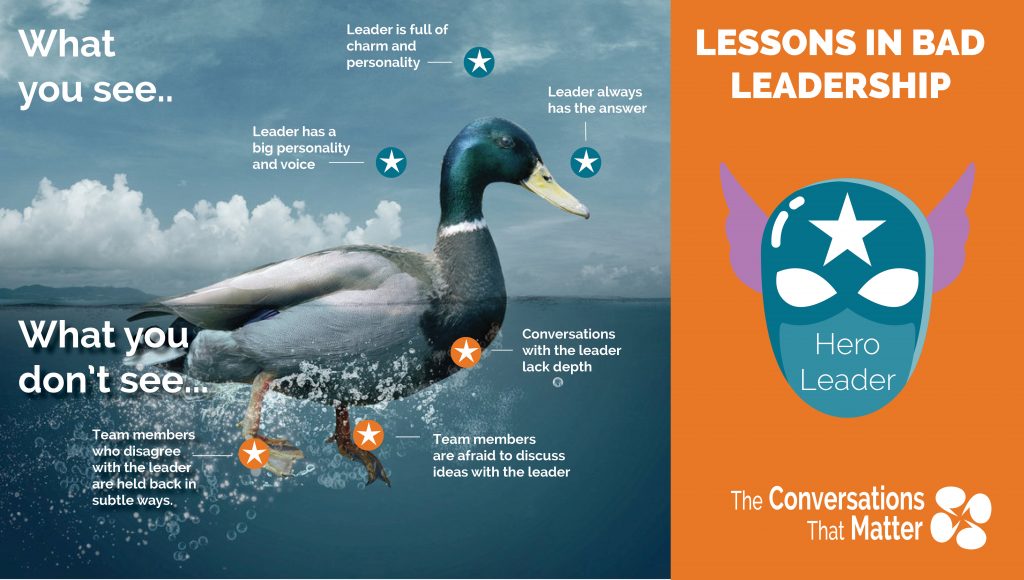
Lessons in Bad Leadership – The Hero Leader
Fact: The loudest, most confident voice can stifle forward-movement.
On the surface
Your leader is mighty and likes his role as the go-to-always-has-the-answer-person. He has a big personality and draws people and energy to him. Employees and outsiders are easily awed by his charm and presence.
Below the surface
He doesn’t seem to have many long conversations with the people that work with him. There is very little debate or sharing of ideas around him and those who do attempt this are “held back” in subtle ways.
Why this is bad
An open exchange of ideas and productive conflict is critical to forward-moving and growing as an organization. A culture that supports this is critical to the longevity of the organization, especially after this leader is gone.
What the experts say
According to the “Ego is the Enemy of Leadership,” when leaders only choose public and official interactions, rather than taking the time to create authentic interaction, it can lead to a big ego. “As we rise in the ranks, we acquire more power. And with that, people are more likely to want to please us by listening more attentively, agreeing more, and laughing at our jokes. All of these tickle the ego. And when the ego is tickled, it grows.”
Further, HBR says, “An unchecked ego can warp our perspective or twist our values…Our ego is like a target we carry with us. And like any target, the bigger it is, the more vulnerable it is to being hit. In this way, an inflated ego makes it easier for others to take advantage of us. Because our ego craves positive attention, it can make us susceptible to manipulation. It makes us predictable. When people know this, they can play to our ego. When we’re a victim of our own need to be seen as great, we end up being led into making decisions that may be detrimental to ourselves, our people, and our organization.”
As a leader, how can you keep your ego in check?
If you see these traits in yourself (tips for self-correcting)
• Consider what perks of the position feed your ego and which ones help you do your job better? Perhaps give up the ego-feeding perk?
• Build your team with people are not “ego-feeders.” Find and nurture people who are more concerned about the health and future of the organization than of you. Encourage that!
• Check yourself – are you acting out of ego, for your own well-being or out of humility, for the well-being of others and your organization?
If you see these traits in others, how can you encourage them for the sake of the whole organization?
• Model behavior that isn’t ego-centered.
• Share resources. Leadership trends and best-practices today center around authentic, low-ego leadership. Find a book that speaks to you and share it. Need help? Start with “Leadership and Self-Deception” by the Arbinger Institute
• Invite that person or group of people to consider the alternative. If you aren’t able to connect with a person one-on-one, perhaps having a third-party facilitator come in and do group training or leadership coaching might serve you well. Hint-hint – CALL US!
Take action:
